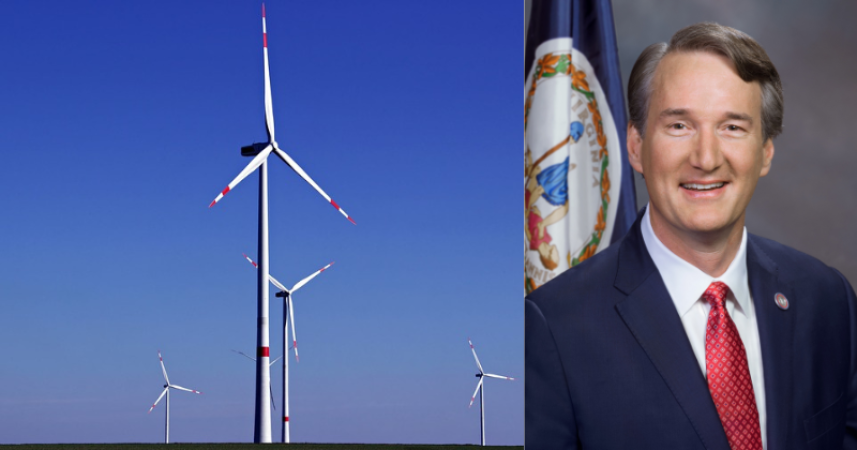Governor Glenn Youngkin (R) has proposed a stronger requirement in state law that any second wave of offshore wind serving Virginia be subjected to a competitive procurement process, rather than simply allowing Dominion Energy Virginia to build it with all the costs and risks imposed on its customers.
The planned 176-turbine Coastal Virginia Offshore Wind (CVOW) project now under federal environmental review remains the only such project in the United States which is being developed directly by a monopoly utility. Other projects involve third party developers raising the capital and taking on much of the financial risk for the multi-billion dollar investments, then selling the power to utilities.
This is just one of several consumer-oriented amendments Youngkin proposed on a series of energy bills, to be voted on at the General Assembly’s reconvened session April 12. Should the Assembly reject his amendments, his option then is to either sign or veto the bill as it passed in February.
The financial and operational risk imposed on ratepayers by direct utility ownership of the wind farm was the focus of debate before the State Corporation Commission (SCC) finally authorized the project, now estimated to cost $10 billion. A method to shift some of the risk to the company’s shareholders if power output fell below projections was initially accepted but then abandoned by the regulators.
Youngkin has now proposed a major rewrite of what was a fairly innocuous bill dealing with Dominion’s planned, but not yet applied for, second wave of turbines off Virginia Beach. As introduced, House Bill 2444 encouraged the State Corporation Commission to look favorably on a project using Virginia-manufactured parts, in part because a major turbine manufacturer is considering setting up such a factory in Hampton Roads.
The Governor’s proposed substitute preserves that language but sets up an advisory body led by a state agency head to compare the cost and benefits of utility ownership versus third party ownership, deciding the matter “on a cost per megawatt hour basis” including any needed transmission expenses.
State law is also amended by the substitute to make it clear a power purchase agreement for wind generation satisfies the Virginia Clean Economy Act, which Dominion argues requires that it own 65% of all the wind and solar developed to satisfy its mandates.
This approach on reviewing a second wind tranche offered by Youngkin was not something discussed during the session, or at any point during the debate over the first major wind project. In other amendments he has now proposed, the Governor is trying to revive proposals which were attempted but not adopted just weeks ago.
When Dominion first offered its major regulatory legislation for 2023, one provision supported by Republicans but rejected by Democrats involved another aspect of the 2020 Virginia Clean Economy Act. It proposed to give the SCC authority over the planned retirements of existing fossil fuel generation plants, allowing the SCC to keep them operational on its own motion to protect system reliability.
That provision disappeared from the final conference report on the bill dealing with the utility’s rates and profit margins. Youngkin has now brought it back as a proposed amendment to House Bill 2026, which as passed dealt with Virginia’s biomass generation facilities. In this case the Governor has proposed amendments to the bill, not a substitute, and those amendments can be voted on individually.
The language he proposes to add requires a utility that wants to retire a fossil fuel plant to first get a ruling from the SCC on whether doing so would impair system safety or reliability. And closing a loophole the SCC itself pointed out last year, the amendment would allow the SCC to act on its own to extend the closure deadlines in the VCEA to protect system reliability.
Yet another amendment to the bill would allow zero-emission hydrogen projects or any new nuclear energy developed after January 1 of this year to be considered renewable energy and to count toward the renewable energy percentage mandates in the VCEA. This, too, was proposed in the regular session but failed to pass. Lots of reasons were given, but as written VCEA is focused on wind, solar and battery projects and fewer of those may be built if nuclear and hydrogen can compete with them.
Legislation to strengthen an existing legislative study panel on energy issues also got Youngkin’s attention and he has offered a major substitute. The Commission on Electric Utility Regulation (formerly Restructuring) has long existed but has largely been moribund, meeting almost never, dominated by the utilities and legislators favorable to their whims. The acronym CEUR is pronounced by critics as “sewer”.
House Bill 2275 and a Senate companion were intended to breathe life into it, adding citizen membership and series of required activities and reports. The Governor’s substitute requires that those citizen members have expertise in ratepayer advocacy, and also adds to the membership the Attorney General of an assistant attorney general who works on utility regulation matters.
Youngkin has also proposed that the panel take on a major task, the preparation of ratepayer impact statements on proposed utility legislation. The lack of such information from a disinterested source has been a weakness as the Assembly has wrestled with bill in recent years. The SCC has long resisted being required to prepare such impact statements (and legislators often don’t ask anyway), but in recent years has taken to providing hard data on specific questions from legislators.
Virginia’s problem in recent years has been the legislature’s eagerness to take over the role of energy regulator, to substitute its judgement for that of the SCC, to substitute a secretive political process for open debate in a court of record. The legislators’ general lack of knowledge is one reason that was a problem, and adding to knowledge may be preferable to remaining in ignorance.
But if this strengthened and empowered panel adds to the legislative appetite for control, it may not represent progress.

Steve Haner is Senior Fellow with the Thomas Jefferson Institute for Public Policy. He may be reached at steve@thomasjeffersoninst.org.






